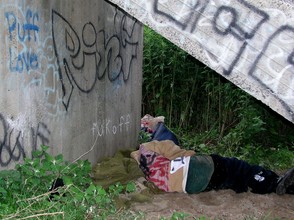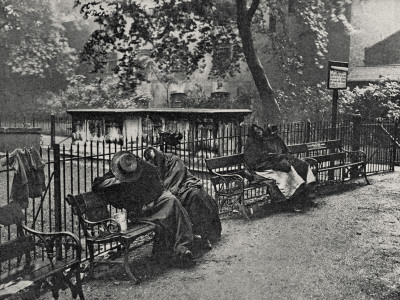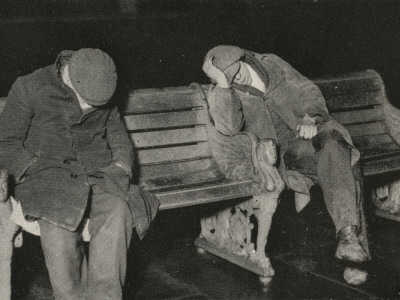Homelessness in London is a problem. There are over 2,000 homeless people in London at any given time in 2014. Hardly a good statistic for the financial capital of the world. What are the causes of homelessness and what can be done about it? What is the definition of homelessness and does the local authority have a duty to re-house you? House prices in London are so high, many people who were born here can no longer afford to buy in the capital.

Homelessness in London
by Telesto
Homelessness in London is a problem. There are over 2,000 homeless people in London at any given time in 2014. Hardly a good statistic for the financial capital of the world.
At the time of writing, Londoners can expect to see 2,000 homeless people sleeping rough in their city at any given time. With a population of over 8 million people, you might think that’s a small number, but it’s staggering when you consider that in 2012/13, the figure was only believed to be 6,437 in the whole year.
I’ll be honest, along with most Londoners, I shy away from rough sleepers. Some of them - and I must stress this is some of them - can be rude and abusive. I’ve seen them sit right under ATM machines so that if you need to get money you can’t say you don’t have any when they ask you. But that’s only one side of the coin, isn’t it? What causes homelessness and what does it really mean?
The average life expectancy of rough sleepers is 42 years. Compare this with the average of 79 years for the rest of the UK. And rough sleepers are 35 times more likely to commit suicide.
Why do people become homeless?
There are lots of reasons why people join the ranks of the homeless, and it might be just one thing that triggers it. It’s generally accepted that the following may all, in extreme cases, lead to homelessness:
- Breakdown of marriage or a relationship - quite simply, a person may no longer have anywhere to live, and insufficient money to get somewhere else.
- Alcoholism or some other addiction. It may be that the cost of the addiction makes the person unable to afford their rent or mortgage.
- Job loss - again, insufficient money to pay the mortgage or rent.
- Escaping from an abusive relationship. If a person has nowhere else to go, but is in some form of abusive relationship, they may see homelessness as a better option. Extreme? Yes. But only that person can know how bad things are for them.
- Mental illness. Without the right support mechanisms, some people with mental illness can end up living on the streets. And many local authority services have been cut.
- Physical illness can cause depression, which can go on to prevent someone coping with their day to day life.
- Leaving the armed forces or prison. It can be very hard for someone to cope with civilian life after leaving the forces, especially if they have undiagnosed PTSD. Similarly, it can be very hard to get used to “normal” life after leaving prison or another institution.
- Death of a loved one. Bereavement can have a strange effect on all of us, and sometimes, we may not be able to cope.
- Getting into debt. Once again, no money to pay rent or mortgage.
Definition of Homelessness
The legal definition is that you must either lack a secure place in which you are entitled to live, or you are not reasonably able to stay in your current accommodation. This alone does not mean that a local authority has to re-house you though. If you are single, without children, and homeless, it is unlikely that a local authority will re-home you.
Hidden Homelessness
Not all homeless people are rough sleepers. Many homeless people sleep on the floor of friends or family while they try to sort their lives out – so called “Sofa Surfing.” This is part of what is known as Hidden Homelessness and largely goes uncounted. Included in this, are those living in hostels, bed and breakfast and other temporary accommodation, squatting and those living in severely overcrowded accommodation. It’s estimated that there are 400,000 people in this category at any one time in the UK. Not as bad as sleeping on the streets, but still, what a way to live.
Do the Authorities have to Re-house Me?
If you have somewhere that you could live, no. Priority housing cases are those who are pregnant, or with young children, or those aged 16 or 17, or between 18 and 20 if they have recently been in the care of social services. Other priority cases are those who have had to leave their homes as a result of flooding or fire, or if the person is vulnerable – maybe because of recently leaving prison, or because they have been the victim of domestic violence.
If you’ve done something to cause your homelessness, or you were made homeless because of something you didn’t do but should have, you may be classed as intentionally homeless, which will impact on what the local authority does to assist you.
Effects of Homelessness and other Dependencies
All homelessness has an impact on a person’s life. It’s really difficult to get a job if you don’t have a fixed address, and if you can’t get a job, it’s difficult to move on and get somewhere permanent, particularly if you are single and not a priority housing case.
Homelessness and its impacts can spiral into a vicious circle – you can’t get a job, so you get depressed, which may lead to substance misuse, which is often a contributory factor in homelessness.
All homelessness has an impact on a person’s life. It’s really difficult to get a job if you don’t have a fixed address, and if you can’t get a job, it’s difficult to move on and get somewhere permanent, particularly if you are single and not a priority housing case.
Homelessness and its impacts can spiral into a vicious circle – you can’t get a job, so you get depressed, which may lead to substance misuse, which is often a contributory factor in homelessness.
Solutions?
There is no simple answer to this. A price crash will affect people with mortgages – having been in negative equity myself, I can tell you that’s not a good place to be, plus it has the potential to cause more homelessness. More homes need to be built, but this will take time, and, where? The government needs to set a housing policy that will address the long-term needs for London.
You might also like
Thinking about NalediThe new discoveries in the Rising Star cave in South Africa arouse questions ...
Shipwreck: the Edmund FitzgeraldBesides the song Wreck of the Edmund Fitzgerald, there's so much more about t...










 Identity Theft and How it Feelson 02/01/2015
Identity Theft and How it Feelson 02/01/2015
 Barts Hospital - a National Treasureon 01/24/2015
Barts Hospital - a National Treasureon 01/24/2015
 Urban Foxeson 01/11/2015
Urban Foxeson 01/11/2015
 How do you know which hosting platform to choose?on 01/03/2015
How do you know which hosting platform to choose?on 01/03/2015



Comments
You are so right.
Britain needs a change of government to one that cares for the poor.
Yes, you're right, I know what I will be doing with that lottery win when it comes....
I wish there was a home for every one in this planet. Third world countries are worse, for homeless people days go without food and shelter. Most badly affected are kids and old people, we need more NGOs and volunteers.
Hello Kathleen, thank you. You're right it is going to get worse. I just don't know what the answer is.
Really found this interesting. It can only get worse with the state of the housing market, funding cuts to charitable organisations, benefits, etc. Thanks for highlighting.
I can't speak for other countries, but I know that here in the UK, some government funding has been pulled. Some ex - forces personnel can make the adjustment to civilian life and I think that is still a problem.
I agree that social housing could help a lot. Also, I would think more NGOs would care to get involved. As it is, I haven't heard of many in this area (here in Romania or abroad).
You are absolutely right. I never did understand the rationale for selling off so much council housing stock. I just think this will take years to solve.
Fully agreed about the problem's growing worse. We in Britain need to build more social housing, but the builders are reluctant, as they don't get the profit from it that they get from more expensive housing.There was never any wrong in council housing. I grew up in council houses and was happy and well-housed. True, some councils were not well run, but that does not obviate the value of council housing.